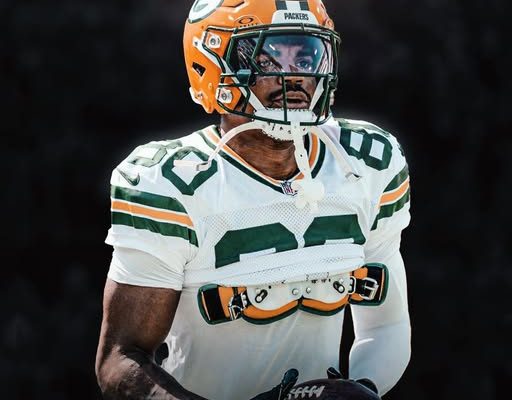The Green Bay Packers are making headlines this offseason with a surprising and bold move that involves one of their young and dynamic players, Bo Melton. Once known as a wide receiver with explosive potential, Melton is now set to make a complete position change to cornerback, an unorthodox yet intriguing decision by the Packers’ front office. Green Bay general manager Brian Gutekunst confirmed the news, stating that Melton is fully committed to the transition and will don the No. 16 jersey, the same number worn by his brother, cornerback Max Melton of the Arizona Cardinals. This decision comes after a unique sequence of offseason events, most notably the departure of Pro Bowl cornerback Jaire Alexander, which has left a significant gap in the Packers’ secondary. Now, with Melton switching sides of the ball, the Packers hope to capitalize on his athleticism, speed, and natural instincts to strengthen their defensive backfield.
The story of Bo Melton’s position switch is not just about filling a roster need—it’s about adaptability, resilience, and seizing an unexpected opportunity. Melton’s skill set as a wide receiver has always been defined by his quick burst off the line of scrimmage, sharp route-running, and the ability to read defensive coverages. Interestingly, these same traits can translate well to playing cornerback, where anticipation, fluid footwork, and an understanding of offensive schemes are crucial. Reports indicate that Melton had already begun taking reps at cornerback earlier this offseason, particularly after Alexander’s release, which signaled a significant shift in the team’s defensive priorities. What began as an experimental trial during offseason practices has now turned into a permanent transition, with the Packers believing that Melton has the raw tools and mental toughness required to succeed on defense.
The symbolic element of Melton wearing No. 16, just like his brother Max Melton, adds a layer of narrative intrigue to the situation. Max, a standout cornerback for the Arizona Cardinals, has already earned a reputation as a tenacious defender with exceptional ball skills. For Bo, sharing the same number as his brother could serve as both inspiration and a reminder of the standards he aims to uphold. The Melton brothers have always been close, and Max has reportedly given Bo advice on the nuances of playing cornerback, including tips on footwork, press coverage techniques, and how to remain disciplined when facing elite NFL receivers. It’s a rare and fascinating storyline to see siblings excelling at the same position across different NFL teams, and Bo’s switch only deepens the connection between their careers.
For the Packers, this decision also reflects the team’s growing emphasis on versatility. In recent years, NFL rosters have increasingly valued players who can contribute across multiple roles, and Green Bay’s coaching staff appears to believe that Melton’s high football IQ and adaptability give him a chance to thrive in the secondary. Gutekunst noted in his statement that Melton is “all for it,” indicating that the player himself is enthusiastic about the challenge. In today’s NFL, the ability to pivot and reinvent oneself can make the difference between being a roster bubble player and a long-term contributor. Melton’s willingness to embrace such a dramatic shift in his career shows a maturity and competitive drive that could pay dividends not only for himself but for the entire Packers defense.
While Melton’s transition is grabbing attention now, the road ahead will not be without challenges. Learning the technical aspects of playing cornerback at the NFL level is no easy task, especially for someone who has spent their entire career focusing on offensive responsibilities. Cornerbacks must master backpedaling techniques, understand zone versus man coverage responsibilities, and learn how to track the ball while staying tight on receivers—all while avoiding penalties for holding or pass interference. However, Melton has an advantage that not all converts possess: his experience as a wide receiver gives him firsthand knowledge of how opposing receivers think and operate. He knows how receivers set up their routes, use subtle body language to deceive defenders, and exploit defensive weaknesses. If he can reverse-engineer that understanding to anticipate opponents’ moves, he could potentially develop into a surprisingly effective cornerback.
The Packers’ defensive unit is in an interesting transitional phase. With Alexander’s departure, the team faces the challenge of retooling its cornerback group, which has been a cornerstone of their defense for several years. Melton’s move to cornerback might be unconventional, but it speaks volumes about the Packers’ confidence in his athletic upside. During his time as a wide receiver, Melton displayed elite straight-line speed, which is crucial for a cornerback tasked with covering deep threats. He also demonstrated reliable hands, which could translate into creating turnovers if he’s able to get into position for interceptions. Green Bay’s defensive coaching staff, led by defensive coordinator Jeff Hafley, is reportedly enthusiastic about working closely with Melton to accelerate his learning curve. Hafley’s reputation for developing defensive backs could play a key role in ensuring this experiment becomes a success story rather than a short-lived experiment.
Another aspect that makes this story compelling is the family dynamic. The Melton brothers now represent two sides of an NFL rivalry in the NFC. Bo with the Packers and Max with the Cardinals creates a narrative arc that could be exciting to follow, especially if the two brothers face off on the field at some point in the future. Both brothers grew up dreaming of NFL stardom, and their journeys, while different, now converge around the cornerback position. Bo’s switch to defense almost feels like a tribute to his brother’s success, while simultaneously forging his own unique path. Fans of both teams will no doubt keep a close eye on how Bo adapts to his new role, especially considering the high expectations that come with such a high-profile change.
This decision also raises questions about how the Packers will deploy Melton during the upcoming season. Will he be a starter right away, or will he initially see action in special packages and nickel or dime formations? Given his lack of in-game experience at cornerback, it’s likely that the coaching staff will ease him into the role gradually. He could also continue to contribute on special teams, where his speed and agility are assets. Over time, however, if he proves himself in practice and preseason games, there’s no reason why Melton couldn’t emerge as a key rotational player or even a starter in the Packers’ defensive backfield.
From a historical standpoint, position changes in the NFL have produced mixed results. There are success stories—players like Richard Sherman, who was originally a wide receiver before transitioning to cornerback in college, went on to become one of the best defensive backs of his era. Similarly, Julian Edelman was a college quarterback who became a star NFL wide receiver. These examples show that with the right mindset, coaching, and dedication, position changes can lead to remarkable career trajectories. Bo Melton will no doubt be hoping to follow a similar path, proving doubters wrong and showing that he can not only survive but thrive as a cornerback in one of the league’s most demanding positions.
In the larger context of the Packers’ roster-building strategy, this move underscores the team’s willingness to think outside the box. Instead of relying solely on free agency or the draft to address their secondary needs, they’re experimenting with internal solutions. It’s a gamble, but one that could yield high rewards if Melton adapts quickly and develops into a reliable cornerback. The team’s defensive scheme, which places a premium on speed and coverage versatility, could also be a good fit for Melton’s natural athleticism. His ability to mirror opposing receivers, combined with his deep knowledge of route combinations, might allow him to develop into a unique asset for Green Bay.
For now, the narrative around Bo Melton is one of intrigue, potential, and determination. The fact that he is embracing the challenge wholeheartedly speaks to his character. Position changes of this magnitude are often as much mental as they are physical, requiring a willingness to unlearn old habits while rapidly acquiring new skills. Early reports from the Packers’ camp suggest that Melton has been a quick study, working tirelessly to refine his technique and seek feedback from coaches and teammates alike. Veterans in the secondary have reportedly welcomed him with open arms, recognizing the dedication and work ethic he’s bringing to the new role.
Looking ahead to the 2025 season, Bo Melton’s progress will be one of the most closely watched storylines in Green Bay. Fans are curious to see how he performs in preseason action and whether he can translate his athletic gifts into consistent defensive play. While there’s always risk in such transitions, the upside is tantalizing. If Melton can become even a solid rotational corner, the Packers will have not only filled a critical need but also created a feel-good story about resilience and adaptability in the NFL.
As for Melton himself, this move could redefine his career. Wide receivers often face a crowded depth chart and limited opportunities, especially when competing with established stars. By switching to cornerback, Melton is essentially giving himself a second chance at NFL longevity. The league is always hungry for cornerbacks who can cover well and create turnovers, and if he can find success in this new role, his value will skyrocket. The parallels with his brother Max also create a motivational element—iron sharpening iron, as they say. There is little doubt that Max will be one of Bo’s biggest supporters and critics, offering guidance and encouragement as his younger brother embarks on this new chapter.
Ultimately, the story of Bo Melton’s position switch is about more than just football—it’s about embracing change, overcoming doubt, and chasing greatness even when the path forward is uncertain. By wearing No. 16, Melton is not only honoring his brother but also setting out to prove that he can carve out his own legacy on defense. Whether this bold experiment turns into a long-term success or simply a fascinating footnote in Packers history, one thing is clear: Bo Melton’s journey is one to watch, and it perfectly encapsulates the spirit of adaptability and determination that defines the NFL.



